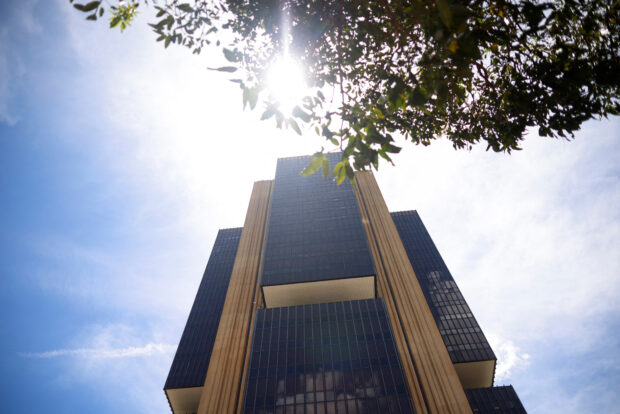Brazil central bank cuts rates, with more likely to come

A general view of the Central Bank headquarters building in Brasilia, Brazil Feb 14, 2023. REUTERS/Adriano Machado/File photo
BRASILIA -Brazil’s central bank cut its benchmark interest rate by 50 basis points on Wednesday for the third time in a row and once again signaled more of the same for its upcoming meetings, but also flagged an “adverse” external backdrop for emerging economies.
The bank’s rate-setting committee, known as Copom, unanimously reduced its Selic benchmark interest rate to 12.25 percent, a move expected by all 40 economists polled by Reuters.
“If the scenario evolves as expected, the committee members unanimously anticipate further reductions of the same magnitude in the next meetings, and judge that this pace is appropriate to keep the necessary contractionary monetary policy for the disinflationary process,” said the central bank in its decision’s statement.
However, despite its expectation of keeping its pace of rate cuts, the bank mentioned an “adverse” global outlook that “requires caution on the conduct of monetary policy.”
The prospect of higher long-term U.S. interest rates has led to a tightening of global liquidity and strengthening of the dollar, adding to inflation pressures in emerging markets like Brazil.
“Despite anticipating the next steps of 50 basis points, there appears to be less visibility and confidence regarding the overall extent of the cycle,” said Daniel Cunha, chief strategist at brokerage BGC Liquidez.
In its statement, the central bank also highlighted the persistence of elevated core inflation in several countries, alongside emerging geopolitical tensions following the outbreak of the Israel-Palestine conflict.
Extent of easing cycle
Policymakers again reiterated that the overall extent of the easing cycle over time will depend on a range of factors, including the inflation dynamics and the output gap, emphasizing the need to maintain a tight policy until the disinflationary process solidifies and inflation expectations meet targets.
Uncertainties about the global scenario and concerns about leftist President Luiz Inacio Lula da Silva’s commitment to fiscal discipline had already caused economists polled by the central bank to tweak their estimates for the easing cycle, forecasting rates to end 2024 at 9.25 percent, up from 9 percent before.
Last week, Lula said his government did not need to erase its primary budget deficit next year, as previously proposed to Congress under new fiscal rules, given the importance of public funding for priority projects and construction investments.
His comments hobbled local markets and reignited concerns about a larger-than-estimated increase in Brazil’s public debt.
The central bank, which had already been pointing to market distrust of the government’s fiscal targets as one of the reasons why long-term inflation expectations were not converging to the target, reaffirmed in its statement the importance of “firmly pursuing” the fiscal goals.
Policymakers revised their inflation projections to 4.7 percent for this year, down from 5 percent before, now standing within the official target of 3.25 percent with a tolerance margin of 1.5 percentage points in either direction.
Meanwhile, inflation forecasts for 2024 and 2025 have been increased to 3.6 percent and 3.2 percent, from 3.5 percent and 3.1 percent respectively. The inflation target for the upcoming year and beyond stands at 3 percent, with the same tolerance interval.